Fleurs du Mal Magazine


Or see the index

Der Sänger
Was hör ich draußen vor dem Tor,
Was auf der Brücke schallen?
Laß den Gesang vor unserm Ohr
Im Saale widerhallen!
Der König sprachs, der Page lief;
Der Knabe kam, der König rief:
Laßt mir herein den Alten!
Gegrüßet seid mir, edle Herrn,
Gegrüßt ihr, schöne Damen!
Welch reicher Himmel, Stern bei Stern!
Wer kennet ihre Namen?
Im Saal voll Pracht und Herrlichkeit
Schließt, Augen, euch; hier ist nicht Zeit,
Sich staunend zu ergetzen.
Der Sänger drückt’ die Augen ein
Und schlug in vollen Tönen;
Die Ritter schauten mutig drein,
Und in den Schoß die Schönen.
Der König, dem das Lied gefiel,
Ließ, ihn zu ehren für sein Spiel,
Eine goldne Kette holen.
Die goldne Kette gib mir nicht,
Die Kette gib den Rittern,
Vor deren kühnem Angesicht
Der Feinde Lanzen splittern;
Gib sie dem Kanzler, den du hast,
Und laß ihn noch die goldne Last
Zu andern Lasten tragen.
Ich singe, wie der Vogel singt,
Der in den Zweigen wohnet;
Das Lied, das aus der Kehle dringt,
Ist Lohn, der reichlich lohnet.
Doch darf ich bitten, bitt ich eins:
Laß mir den besten Becher Weins
In purem Golde reichen.
Er setzt’ ihn an, er trank ihn aus:
O Trank voll süßer Labe!
O wohl dem hochbeglückten Haus,
Wo das ist kleine Gabe!
Ergehts euch wohl, so denkt an mich,
Und danket Gott so warm, als ich
Für diesen Trunk euch danke.
Johann Wolfgang von Goethe
(1749-1832)
Der Sänger
•fleursdumal.nl magazine
More in: # Music Archive, Archive G-H, Archive G-H, Goethe, Johann Wolfgang von, J.W. von Goethe
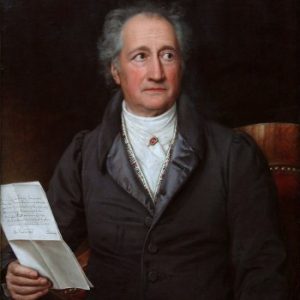
Eins und Alles
Im Grenzenlosen sich zu finden,
Wird gern der Einzelne verschwinden,
Da löst sich aller Überdruß;
Statt heißem Wünschen, wildem Wollen,
Statt läst’gem Fordern, strengem Sollen
Sich aufzugeben ist Genuß.
Weltseele, komm’ uns zu durchdringen!
Dann mit dem Weltgeist selbst zu ringen
Wird unsrer Kräfte Hochberuf.
Teilnehmend führen gute Geister,
Gelinde leitend, höchste Meister,
Zu dem, der alles schafft und schuf.
Und umzuschaffen das Geschaffne,
Damit sich’s nicht zum Starren waffne,
Wirkt ewiges lebend’ges Tun.
Und was nicht war, nun will es werden
Zu reinen Sonnen, farbigen Erden,
In keinem Falle darf es ruhn.
Es soll sich regen, schaffend handeln,
Erst sich gestalten, dann verwandeln;
Nur scheinbar steht’s Momente still.
Das Ewige regt sich fort in allen:
Denn alles muß in Nichts zerfallen,
Wenn es im Sein beharren will.
Johann Wolfgang von Goethe
(1749-1832)
Eins und Alles
•fleursdumal.nl magazine
More in: Archive G-H, Archive G-H, Goethe, Johann Wolfgang von, J.W. von Goethe

Philine
Singet nicht in Trauertönen
Von der Einsamkeit der Nacht!
Nein, sie ist, o holde Schönen,
Zur Geselligkeit gemacht.
Wie das Weib dem Mann gegeben
Als die schönste Hälfte war,
Ist die Nacht das halbe Leben,
Und die schönste Hälfte zwar.
Könnt ihr euch des Tages freuen,
Der nur Freuden unterbricht?
Er ist gut, sich zu zerstreuen;
Zu was anderm taugt er nicht.
Aber wenn in nächt′ger Stunde
Süßer Lampe Dämmrung fließt,
Und vom Mund zum nahen Munde
Scherz und Liebe sich ergießt;
Wenn der rasche lose Knabe,
Der sonst wild und feurig eilt,
Oft bei einer kleinen Gabe
Unter leichten Spielen weilt;
Wenn die Nachtigall Verliebten
Liebevoll ein Liedchen singt,
Das Gefangnen und Betrübten
Nur wie Ach und Wehe klingt:
Mit wie leichtem Herzensregen
Horchet ihr der Glocke nicht,
Die mit zwölf bedächt′gen Schlägen
Ruh′ und Sicherheit verspricht!
Darum an dem langen Tage
Merke dir es, liebe Brust:
Jeder Tag hat seine Plage,
Und die Nacht hat ihre Lust.
Johann Wolfgang von Goethe
(1749-1832)
Philine
•fleursdumal.nl magazine
More in: Archive G-H, Archive G-H, Goethe, Johann Wolfgang von, J.W. von Goethe
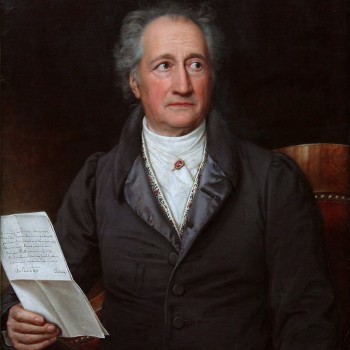
Totentanz
Der Türmer, der schaut zu Mitten der Nacht
Hinab auf die Gräber in Lage;
Der Mond, der hat alles ins Helle gebracht;
Der Kirchhof, er liegt wie am Tage.
Da regt sich ein Grab und ein anderes dann:
Sie kommen hervor, ein Weib da, ein Mann,
In weißen und schleppenden Hemden.
Das reckt nun, es will sich ergetzen sogleich,
Die Knöchel zur Runde, zum Kranze,
So arm und so jung, und so alt und so reich;
Doch hindern die Schleppen am Tanze.
Und weil hier die Scham nun nicht weiter gebeut,
Sie schütteln sich alle, da liegen zerstreut
Die Hemdlein über den Hügeln.
Nun hebt sich der Schenkel, nun wackelt das Bein,
Gebärden da gibt es vertrackte;
Dann klippert’s und klappert’s mitunter hinein,
Als schlüg’ man die Hölzlein zum Takte.
Das kommt nun dem Türmer so lächerlich vor;
Da raunt ihm der Schalk, der Versucher, ins Ohr:
Geh! hole dir einen der Laken.
Getan wie gedacht! und er flüchtet sich schnell
Nun hinter geheiligte Türen.
Der Mond, und noch immer er scheinet so hell
Zum Tanz, den sie schauderlich führen.
Doch endlich verlieret sich dieser und der,
Schleicht eins nach dem andern gekleidet einher,
Und, husch, ist es unter dem Rasen.
Nur einer, der trippelt und stolpert zuletzt
Und tappet und grapst an den Grüften;
Doch hat kein Geselle so schwer ihn verletzt,
Er wittert das Tuch in den Lüften.
Er rüttelt die Turmtür, sie schlägt ihn zurück,
Geziert und gesegnet, dem Türmer zum Glück,
Sie blinkt von metallenen Kreuzen.
Das Hemd muß er haben, da rastet er nicht,
Da gilt auch kein langes Besinnen,
Den gotischen Zierat ergreift nun der Wicht
Und klettert von Zinne zu Zinnen.
Nun ist’s um den armen, den Türmer getan!
Es ruckt sich von Schnörkel zu Schnörkel hinan,
Langbeinigen Spinnen vergleichbar.
Der Türmer erbleichet, der Türmer erbebt,
Gern gäb er ihn wieder, den Laken.
Da häkelt – jetzt hat er am längsten gelebt –
Den Zipfel ein eiserner Zacken.
Schon trübet der Mond sich verschwindenden Scheins,
Die Glocke, sie donnert ein mächtiges Eins,
Und unten zerschellt das Gerippe.
Johann Wolfgang von Goethe
(1749-1832)
Totentanz
•fleursdumal.nl magazine
More in: Archive G-H, Archive G-H, Goethe, Johann Wolfgang von, J.W. von Goethe

Neue Liebe, neues Leben
Herz, mein Herz, was soll das geben?
Was bedränget dich so sehr?
Welch ein fremdes, neues Leben !
Ich erkenne dich nicht mehr.
Weg ist alles was du liebtest,
Weg, warum du dich betrübtest,
Weg dein Fleiß und deine Ruh –
Ach, wie kamst du nur dazu !
Fesselt dich die Jugendblüte,
Diese liebliche Gestalt,
Dieser Blick voll Treu und Güte
Mit unendlicher Gewalt?
Will ich rasch mich ihr entziehen,
Mich ermannen, ihr entfliehen,
Führet mich im Augenblick,
Ach, mein Weg zu ihr zurück.
Und an diesem Zauberfädchen,
Das sich nicht zerreißen lässt,
Hält das liebe lose Mädchen
Mich so wider Willen fest;
Muss in ihrem Zauberkreise
Leben nun auf ihre Weise.
Die Veränderung, ach, wie groß!
Liebe! Liebe! Laß mich los!
Johann Wolfgang von Goethe
(1749-1832)
Neue Liebe, neues Leben
•fleursdumal.nl magazine
More in: Archive G-H, Archive G-H, Goethe, Johann Wolfgang von, J.W. von Goethe
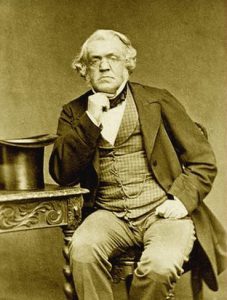
Sorrows of Werther
WERTHER had a love for Charlotte
Such as words could never utter;
Would you know how first he met her?
She was cutting bread and butter.
Charlotte was a married lady,
And a moral man was Werther,
And for all the wealth of Indies
Would do nothing for to hurt her.
So he sigh’d and pin’d and ogled,
And his passion boil’d and bubbled,
Till he blew his silly brains out,
And no more was by it troubled.
Charlotte, having seen his body
Borne before her on a shutter,
Like a well-conducted person,
Went on cutting bread and butter.
William Makepeace Thackeray
(1811–63)
Sorrows of Werther
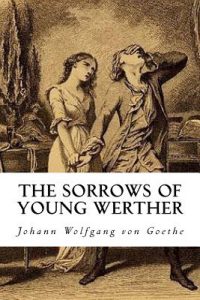
• fleursdumal.nl magazine
More in: # Classic Poetry Archive, -Die Leiden des jungen Werther, Archive S-T, Archive S-T
Eline Arbo, nieuwe maakster bij Toneelschuur Producties, bewerkt voor deze eerste voorstelling zelf de klassieke roman van Johann Wolfgang von Goethe, waarin Werther vecht voor zijn ideale liefde.
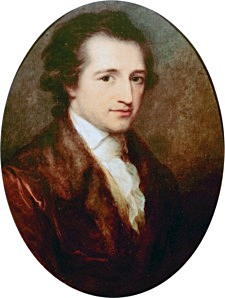 En zij daagt je uit na te denken over: Waar geloof ik in? En hoe ver ben ik bereid daarvoor te gaan?
En zij daagt je uit na te denken over: Waar geloof ik in? En hoe ver ben ik bereid daarvoor te gaan?
Tijdens zijn verblijf op het platteland wordt Werther hevig verliefd op Lotte, een meisje dat al verloofd is met Albert. Hij gooit zijn hartstocht volledig in de strijd. Wanneer zijn liefde voor Lotte onbeantwoord blijft, ziet hij geen andere uitweg dan de dood.
Goethes eerste roman is na zijn publicatie in 1774, te midden van de ‘Sturm und Drang’-periode, direct een ongekend succes en leidt tot een heuse ‘Werther-Fieber’ onder jongvolwassenen: mannen herkennen zich in zijn verhaal, kleden zich identiek aan hun held en een golf van zelfmoorden raast door Europa.
Eline Arbo over ‘Het lijden van de jonge Werther’
“Ik ben gefascineerd door de stelligheid van Werther om het gevoel als richtlijn voor zijn handelen te gebruiken. Hij is volhardend in zijn houding – met de dood tot gevolg. Is hij een hysterische egoïst of ligt er juist kracht in Werthers irrationele levenswijze? Juist die spanning tussen gevoel en verstand vind ik interessant en wil ik in deze voorstelling onderzoeken.”
Eline Arbo studeerde in de zomer van 2016 af aan de Regie Opleiding van de Amsterdamse Hogeschool voor de Kunsten en viel daar op met haar afstudeervoorstellingen Manifesten en Antigone. Arbo onderzoekt in haar voorstellingen sociaal maatschappelijke thema’s via eigenzinnige concepten.
regie Eline Arbo tekst Johann Wolfgang von Goethe bewerking Eline Arbo gebaseerd op de vertaling van Thérèse Cornips (© 1975 Stichting Thérèse Cornips) met Diewertje Dir, Sander Plukaard, Victor IJdens decor Juul Dekker kostuums Sarah Nixon licht Varja Klosse dramaturgie Thomas Lamers muzikaal leider Thijs van Vuure met dank aan Sofie de Wilde, Roos Matla, Saar Scheerlings, Sarah Lefevre, Eva Bosma, Huib Nelissen Decorbouw
 Het lijden van de jonge Werther, theater
Het lijden van de jonge Werther, theater
Van: Johann Wolfgang von Goethe
Door: Toneelschuur Producties
Regie: Eline Arbo.
23/9, Toneelschuur, Haarlem.
Tournee t/m 19/10.
vr 06 okt 2017
Den Haag
Theater aan het Spui
wo 18 okt t/m
do 19 okt 2017
Amsterdam
Theater Bellevue
‘Een groot expressionistisch theaterfeest’ ★★★★★ Volkskrant
‘Prachtige vondsten in overtuigend debuut’ Haarlems Dagblad
# Meer info website toneelschuur
Toneelschuur Producties / Eline Arbo:
Het lijden van de jonge Werther, theater
Van Johann Wolfgang von Goethe
fleursdumal.nl magazine
More in: Archive G-H, Art & Literature News, Goethe, Johann Wolfgang von, J.W. von Goethe, THEATRE, TRANSLATION ARCHIVE

The Sorrows of Young Werther (73 = The end) by J.W. von Goethe The house, the neighbourhood, and the whole town were immediately in commotion. Albert arrived. They had laid Werther on the bed: his head was bound up, and the paleness of death was upon his face. His limbs were motionless; but he still breathed, at one time strongly, then weaker--his death was momently expected. He had drunk only one glass of the wine. "Emilia Galotti" lay open upon his bureau. I shall say nothing of Albert's distress, or of Charlotte's grief.The old steward hastened to the house immediately upon hearing the news: he embraced his dying friend amid a flood of tears. His eldest boys soon followed him on foot. In speechless sorrow they threw themselves on their knees by the bedside, and kissed his hands and face. The eldest, who was his favourite, hung over him till he expired; and even then he was removed by force. At twelve o'clock Werther breathed his last. The presence of the steward, and the precautions he had adopted, prevented a disturbance; and that night, at the hour of eleven, he caused the body to be interred in the place which Werther had selected for himself. The steward and his sons followed the corpse to the grave. Albert was unable to accompany them. Charlotte's life was despaired of. The body was carried by labourers. No priest attended. THE END The Sorrows of Young Werther (Die Leiden des jungen Werther) by J.W. von Goethe. Translated by R.D. Boylan. fleursdumal.nl magazine
More in: -Die Leiden des jungen Werther, Goethe, Johann Wolfgang von

The Sorrows of Young Werther (72) by J.W. von Goethe A neighbour saw the flash, and heard the report of the pistol; but, as everything remained quiet, he thought no more of it. In the morning, at six o'clock, the servant went into Werther's room with a candle. He found his master stretched upon the floor, weltering in his blood, and the pistols at his side. He called, he took him in his arms, but received no answer. Life was not yet quite extinct. The servant ran for a surgeon, and then went to fetch Albert. Charlotte heard the ringing of the bell: a cold shudder seized her. She wakened her husband, and they both rose. The servant, bathed in tears faltered forth the dreadful news. Charlotte fell senseless at Albert's feet.When the surgeon came to the unfortunate Werther, he was still lying on the floor; and his pulse beat, but his limbs were cold. The bullet, entering the forehead, over the right eye, had penetrated the skull. A vein was opened in his right arm: the blood came, and he still continued to breathe. From the blood which flowed from the chair, it could be inferred that he had committed the rash act sitting at his bureau, and that he afterward fell upon the floor. He was found lying on his back near the window. He was in full-dress costume. The Sorrows of Young Werther (Die Leiden des jungen Werther) by J.W. von Goethe. Translated by R.D. Boylan. To be continued fleursdumal.nl magazine
More in: -Die Leiden des jungen Werther, Goethe, Johann Wolfgang von

The Sorrows of Young Werther (71) by J.W. von Goethe
“See, Charlotte, I do not shudder to take the cold and fatal cup, from
which I shall drink the draught of death. Your hand presents it to me,
and I do not tremble. All, all is now concluded: the wishes and the
hopes of my existence are fulfilled. With cold, unflinching hand I knock
at the brazen portals of Death. Oh, that I had enjoyed the bliss of
dying for you! how gladly would I have sacrificed myself for you;
Charlotte! And could I but restore peace and joy to your bosom, with
what resolution, with what joy, would I not meet my fate! But it is the
lot of only a chosen few to shed their blood for their friends, and by
their death to augment, a thousand times, the happiness of those by whom
they are beloved.
“I wish, Charlotte, to be buried in the dress I wear at present: it has
been rendered sacred by your touch. I have begged this favour of your
father. My spirit soars above my sepulchre. I do not wish my pockets to
be searched. The knot of pink ribbon which you wore on your bosom
the first time I saw you, surrounded by the children–Oh, kiss them a
thousand times for me, and tell them the fate of their unhappy friend! I
think I see them playing around me. The dear children! How warmly have
I been attached to you, Charlotte! Since the first hour I saw you, how
impossible have I found it to leave you. This ribbon must be buried
with me: it was a present from you on my birthday. How confused it all
appears! Little did I then think that I should journey this road. But
peace! I pray you, peace!
“They are loaded–the clock strikes twelve. I say amen. Charlotte,
Charlotte! farewell, farewell!”
The Sorrows of Young Werther (Die Leiden des jungen Werther) by J.W. von Goethe. Translated by R.D. Boylan.
To be continued
fleursdumal.nl magazine
More in: -Die Leiden des jungen Werther, Goethe, Johann Wolfgang von

The Sorrows of Young Werther (70) by J.W. von Goethe
He spent the rest of the evening in arranging his papers: he tore and
burned a great many; others he sealed up, and directed to Wilhelm.
They contained some detached thoughts and maxims, some of which I have
perused. At ten o’clock he ordered his fire to be made up, and a bottle
of wine to be brought to him. He then dismissed his servant, whose room,
as well as the apartments of the rest of the family, was situated in
another part of the house. The servant lay down without undressing, that
he might be the sooner ready for his journey in the morning, his master
having informed him that the post-horses would be at the door before six
o’clock.
“Past eleven o’clock! All is silent around me, and my soul is calm. I
thank thee, O God, that thou bestowest strength and courage upon me in
these last moments! I approach the window, my dearest of friends; and
through the clouds, which are at this moment driven rapidly along by the
impetuous winds, I behold the stars which illumine the eternal heavens.
No, you will not fall, celestial bodies: the hand of the Almighty
supports both you and me! I have looked for the last time upon the
constellation of the Greater Bear: it is my favourite star; for when
I bade you farewell at night, Charlotte, and turned my steps from your
door, it always shone upon me. With what rapture have I at times beheld
it! How often have I implored it with uplifted hands to witness my
felicity! and even still–But what object is there, Charlotte, which
fails to summon up your image before me? Do you not surround me on all
sides? and have I not, like a child, treasured up every trifle which you
have consecrated by your touch?
“Your profile, which was so dear to me, I return to you; and I pray
you to preserve it. Thousands of kisses have I imprinted upon it, and a
thousand times has it gladdened my heart on departing from and returning
to my home.
“I have implored your father to protect my remains. At the corner of the
churchyard, looking toward the fields, there are two lime-trees–there
I wish to lie. Your father can, and doubtless will, do this much for his
friend. Implore it of him. But perhaps pious Christians will not choose
that their bodies should be buried near the corpse of a poor, unhappy
wretch like me. Then let me be laid in some remote valley, or near the
highway, where the priest and Levite may bless themselves as they pass
by my tomb, whilst the Samaritan will shed a tear for my fate.
The Sorrows of Young Werther (Die Leiden des jungen Werther) by J.W. von Goethe. Translated by R.D. Boylan.
To be continued
fleursdumal.nl magazine
More in: -Die Leiden des jungen Werther, Goethe, Johann Wolfgang von

The Sorrows of Young Werther (69) by J.W. von Goethe
The arrival of Werther’s servant occasioned her the greatest
embarrassment. He gave Albert a note, which the latter coldly handed to
his wife, saying, at the same time, “Give him the pistols. I wish him
a pleasant journey,” he added, turning to the servant. These words
fell upon Charlotte like a thunderstroke: she rose from her seat
half-fainting, and unconscious of what she did. She walked mechanically
toward the wall, took down the pistols with a trembling hand, slowly
wiped the dust from them, and would have delayed longer, had not Albert
hastened her movements by an impatient look. She then delivered the
fatal weapons to the servant, without being able to utter a word. As
soon as he had departed, she folded up her work, and retired at once
to her room, her heart overcome with the most fearful forebodings. She
anticipated some dreadful calamity. She was at one moment on the point
of going to her husband, throwing herself at his feet, and acquainting
him with all that had happened on the previous evening, that she might
acknowledge her fault, and explain her apprehensions; then she saw that
such a step would be useless, as she would certainly be unable to induce
Albert to visit Werther. Dinner was served; and a kind friend whom she
had persuaded to remain assisted to sustain the conversation, which was
carried on by a sort of compulsion, till the events of the morning were
forgotten.
When the servant brought the pistols to Werther, the latter received
them with transports of delight upon hearing that Charlotte had given
them to him with her own hand. He ate some bread, drank some wine, sent
his servant to dinner, and then sat down to write as follows:
“They have been in your hands you wiped the dust from them. I kiss them
a thousand times–you have touched them. Yes, Heaven favours my design,
and you, Charlotte, provide me with the fatal instruments. It was my
desire to receive my death from your hands, and my wish is gratified.
I have made inquiries of my servant. You trembled when you gave him the
pistols, but you bade me no adieu. Wretched, wretched that I am–not one
farewell! How could you shut your heart against me in that hour which
makes you mine for ever? Charlotte, ages cannot efface the impression–I
feel you cannot hate the man who so passionately loves you!”
After dinner he called his servant, desired him to finish the packing
up, destroyed many papers, and then went out to pay some trifling debts.
He soon returned home, then went out again, notwithstanding the rain,
walked for some time in the count’s garden, and afterward proceeded
farther into the country. Toward evening he came back once more, and
resumed his writing.
“Wilhelm, I have for the last time beheld the mountains, the forests,
and the sky. Farewell! And you, my dearest mother, forgive me! Console
her, Wilhelm. God bless you! I have settled all my affairs! Farewell! We
shall meet again, and be happier than ever.”
“I have requited you badly, Albert; but you will forgive me. I have
disturbed the peace of your home. I have sowed distrust between you.
Farewell! I will end all this wretchedness. And oh, that my death
may render you happy! Albert, Albert! make that angel happy, and the
blessing of Heaven be upon you!”
The Sorrows of Young Werther (Die Leiden des jungen Werther) by J.W. von Goethe. Translated by R.D. Boylan.
To be continued
fleursdumal.nl magazine
More in: -Die Leiden des jungen Werther, Goethe, Johann Wolfgang von
Thank you for reading Fleurs du Mal - magazine for art & literature